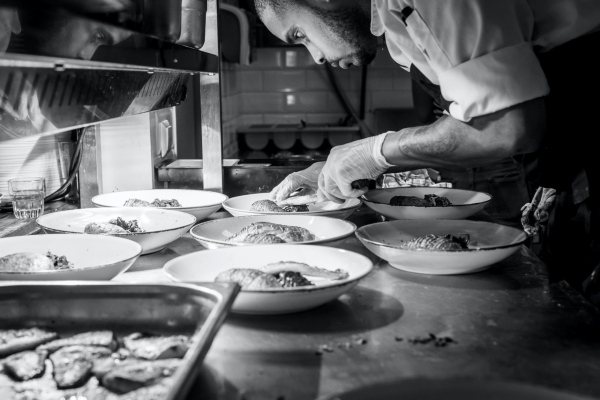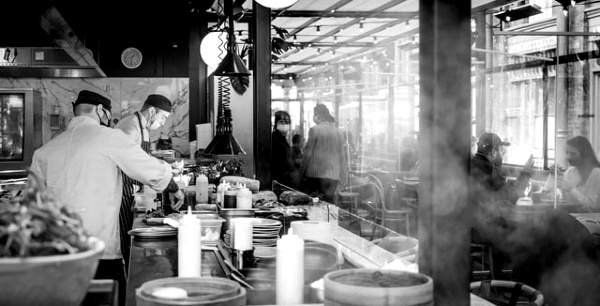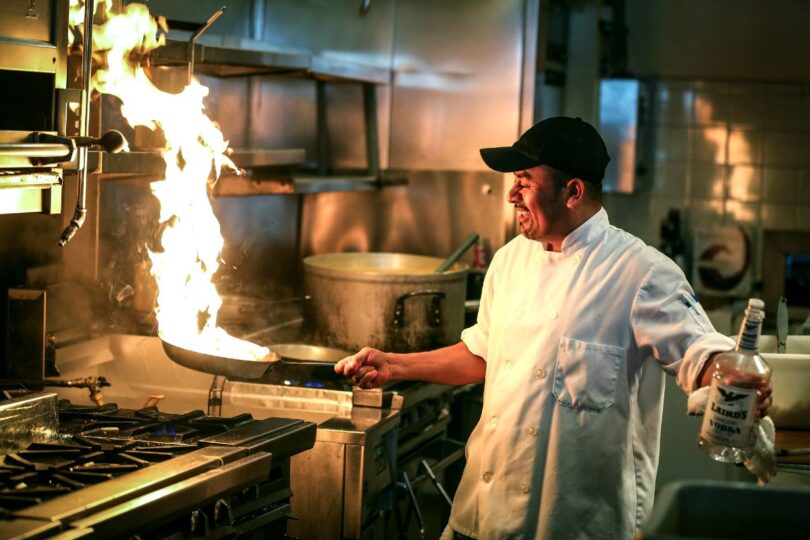Since the foodservice business is rapidly expanding, being a chef is a lucrative and enticing career choice for many citizens. Furthermore, the rise of the Food Network and the proliferation of YouTube celebrity chefs have glamorized the industry. However, life in the catering industry is not as glamorous as it seems on television.
With the pandemic disrupting the foodservice industry, the career has become riskier to follow. However, this does not mean that there won’t be a demand for chefs in the near future. Let’s take a dive into understanding the chef career, by analyzing both the upside and downside to it.
Lows
As with every profession, there are drawbacks to being a chef. Here are few disadvantages to a job in food service:
1. Physical Demands

Photo: Louis Hansel
Working in kitchens requires you to stand and move about for at least 8 hours. You’ll also need to move heavy pots of food, bring big boxes of food, and fill walk-ins with food, all of which can be strenuous for the body. It can get hot, crowded, and dangerous, particularly during the breakfast, lunch, and dinner rushes, as cooks scurry around the kitchen filling orders.
2. Social Life

Photo: Ben Wicks
Weekends are the busiest time of the week for restaurants, and as a result, you’ll almost definitely be working weekends, making it impossible to make plans with family and friends. Furthermore, the long hours will conflict with your other interests and hobbies.
Basically, you’ll be working while everyone else is off, and you’ll be resting when everybody else is working. One of the most significant disadvantages of serving as a chef being the long hours.
3. Kitchen-Related Stresses
Working in the restaurant business and being stressed go hand-in-hand. When working in a restaurant, there will inevitably be moments when the tickets begin to pile up and you must hurry to fill orders. Some people excel in this sort of environment, while others do not. If you have trouble dealing with pressure, becoming a chef might not be the best career path for you.
4. Culinary School Education

Photo: Medina Catering
A culinary school degree is required if you want to work in a fine dining establishment. Experience is beneficial, but culinary school unlocks certain doors that would otherwise be closed. The aim of a degree is to set and achieve a goal for yourself because, regardless of your experience, everybody starts in the kitchen or on the line. Chefs believe that a candidate with education and expertise is more attractive than those with just a culinary school education.
5. Entry Level Pay Is Not so Great
Working as a dishwasher or a line cook would require you to work long hours for about $10 per hour, depending on your venue. After subtracting rent, culinary school debt fees, and living costs, your take-home pay isn’t much. But, thankfully, with experience, you can work your way up the corporate ladder and begin earning a more stable living.
6. Work Experience Differences

Photo: Jeff Siepman
There are many positions available in the food business, ranging from the caterer to restaurant owner to food stylist to private chef. Each of these occupations is vastly different, and each has its own set of advantages and disadvantages.
Highs and Happy Times
Although the downside can be quite scary, being a chef is not without its advantages. Some of the rewards can be quite appealing. Here are some of them;
1. Freedom & Creativity

Photo: Sebastian Coman Photography
Working as a chef provides you with more flexibility and helps you to be more adventurous than almost any other profession. Cooking also allows you to experiment with spices and develop new ones. Also, recipes are just guidelines; you can alter the proportions and add new ingredients to make a dish your own.
2. Chef Bonding

Photo: Clem Onojeghuo
Being a member of a kitchen team fosters a feeling of togetherness similar to that of a football team. As a result, working in a kitchen as part of a team is a fantastic bonding experience, and you’ll gradually get connected with your coworkers.
3. Travel

Photo: Mohamed Nohassi
Food service workers can be found all over the world and in a lot of environments. Working in restaurants can take you to some fascinating places. For example, if you’ve really desired to live in New York City, you can relocate there with the knowledge that there are jobs open to you.
Being a chef also allows you to move about and find the best match for you.
If you don’t want to work in a fine dining restaurant, why not try your hand at catering? Alternatively, you could work at a resort and cook new fish for your customers right on the coast.
4. Access
Working in this industry gets you several connections that might prove beneficial in the future. For instance, if you ever decide to own an establishment, you have access to other chefs, resources, and some of the people you have served might be potential investors in your business.
An added bonus is that there are manufacturers out there that have what you need as a chef. You can easily buy products such as eco-friendly packaging for food and other storage needs on the internet. Don’t compromise quality, when you can have the best.
Conclusion
Choosing a profession is a tough decision to make, and it can not be taken lightly. Becoming a chef is an outstanding career option, but it has its ups and downs, much as every other profession.
Long hours, physical demands, and low starting salary may be tough to swallow, yet if you want to work in food service, you’ll be rewarded with a rewarding career that allows for a lot of flexibility and imagination and is always evolving. Like every other risky career, it takes patience to succeed in culinary arts. All the best!
Feature photo by Johnathan Macedo








